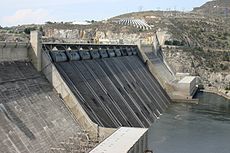
Public good

In economics, a public good is a good that is both non-excludable and non-rivalrous in that individuals cannot be excluded from use or could be enjoyed without paying for it, and where use by one individual does not reduce availability to others or the goods can be effectively consumed simultaneously by more than one person. This is in contrast to a common good such as wild fish stocks in the ocean, which is non-excludable but is rivalrous to a certain degree, as if too many fish are harvested, the stocks will be depleted. Public goods include knowledge, official statistics, national security, common language(s), flood control systems, lighthouses, and street lighting. Public goods that are available everywhere are sometimes referred to as global public goods. Examples of public good knowledge is men's, women's and youth health awareness, environmental issues, maintaining biodiversity, sharing and interpreting contemporary history with a cultural lexicon, particularly about protected cultural heritage sites and monuments, popular and entertaining tourist attractions, libraries and universities. Many public goods may at times be subject to excessive use resulting in negative externalities affecting all users; for example air pollution and traffic congestion. Public goods problems are often closely related to the 'free-rider' problem, in which people not paying for the good may continue to access it. Thus, the good may be under-produced, overused or degraded. Public goods may also become subject to restrictions on access and may then be considered to be club goods; exclusion mechanisms include toll roads, congestion pricing, and pay television with an encoded signal that can be decrypted only by paid subscribers.
